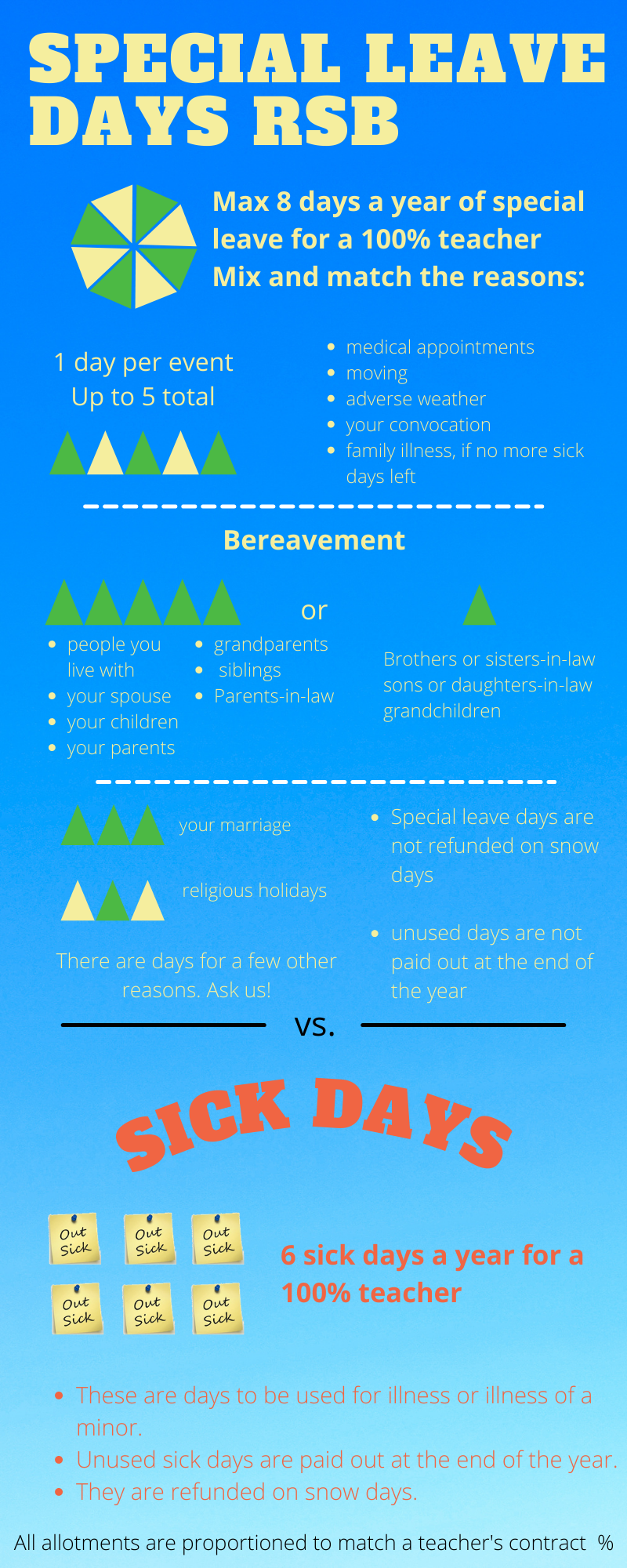<
>
These are 2 main banks of days that teachers in the RSB can use during the school year. SICK DAYS The first is sick days. They are what they sound like, if you or a minor in your care is ill you use a sick day to cover it. These are generally last minute-ish. They are not planned days. A 100% teacher has 6 of these a year. A part time teacher has their % of 6 a year. Currently, any unused sick days are paid out as a day of work on a separate paycheck at the end of the year. If you are in Voc Ed, this payment is rolled into your last paycheck of the year.
SPECIAL LEAVE DAYS There are several subcategories of special leave days. These sub-categories have their own total amounts allowed, and circumstances they cover. Some of the most used reasons are medical appointments, bereavements, and family responsibilities. Unused days of this type are not paid out at the end of the year. These days are NOT refunded in case of emergency non-workdays. (Snow days) Some of the categories require documentation. Documentation can be requested for others, but it’s rare. Whatever Combination of categories are used, the yearly overall cap is 8 days a year for a 100% teacher. A part time teacher has their % of 8 a year. There are basic conditions for these days negotiated at the provincial level, and further details or benefits negotiated at the local level. The local negotiations must fall within the provincial guidelines. Medical appointments and Family Responsibilities A full-time teacher has up to 5 days that can be used for medical appointments. A part time teacher has their % of 5 a year. They can be taken in full day or half day increments. Planning these days and submitting them to AESOP in advance can increase your chances of having your desired supply teacher cover you. Family responsibilities in the form of illness of family members that are minors fall under this category, and can only be used if your sick day bank is empty. Documentation is generally not required for medical appointments, but can be asked for. The 5 days that cover medical appointments and family illness is also used to cover:
Bereavement There are days for “immediate family”. Immediate family is a specific term which is defined as the people you live with, your spouse, your children, your parents, grandparents, and siblings. Parents-in-law are also included. In these cases, you have up to 5 days starting within a week of their death. Brothers or sisters-in-law, sons or daughters-in-law, or grandchildren are not considered immediate family, but you get 1 day to attend their funeral. Extra days are available if you must travel over certain distances to the funeral. There are no other Special leave bereavement leaves. Documentation can be requested. (Obituary, other death announcement) Other Reasons for Special Leaves
Urgent business This one is tempting and vague. The Board has to approve of these on a case by case basis, and they generally reject everything. If your pipes burst in the morning, you might be able to use this one. As a rule, whatever is happening, the board doesn’t consider it urgent business. Documentation is always required. My reason isn’t here! Unfortunately, then there probably isn’t a special leave category that covers you. You can ask for a leave without pay. These need to be submitted to your administration in advance and are subject to approval. If approved, you won’t need to work that day, but you also won’t get paid. No days that prolong summer, Christmas or March break are granted. Contact us for advice in advance, and then email your principal. However, if it’s jury duty, professional improvement, a pandemic, or certain other reasons there are specific non-negotiated, non-benefit, codes that have you covered to some degree. Some of these don’t include getting paid, just not getting disciplined. If you are a no-show or caught mis-using sick days/special leave days, you can be disciplined. Why aren’t all the absence codes listed here? This article focused on the days that are related to your personal circumstances that you can use paid time off for. These are benefits that the unions have negotiated for and continue to defend. Many of the absence codes cover situations that are not negotiated benefits, but edicts from other government bodies, or the administration. I have a weird specific scenario… Contact us! Give us a call, send us an email or use the above contact form to let us know. At the least, we can clarify and there may be something more we can do! Comments are closed.
|
�
Archives
June 2024
Categories
All
|
RTU-SER10 Boul. Churchill, Suite 201,
Greenfield Park (Québec) J4V 2L7 |
|

 RSS Feed
RSS Feed